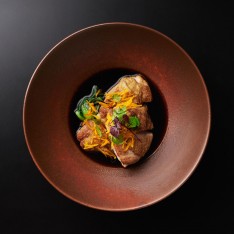Year of the Rooster: Traditional recipes to try

In need of good health, wealth and prosperity? Chinese New Year takes place this weekend and the Year of the Rooster, which represents fidelity and punctuality, will begin. We may all enjoy a Chinese takeaway, but how often do you get chance to make your very own authentic Chinese dish, asks Bethan Tolley?
Yang Sing, based on Princess Street in Manchester, is one of the city’s oldest Chinese restaurants. Marketing director Bonnie Yeung, daughter of chef Harry Yeung, has shared what certain dishes represent over the Chinese New Year and more about the Chinese culture.
Fish — brings luck and prosperity
Bonnie said: “In Chinese, “fish” sounds like the word ‘surplus’. Chinese people like to have a surplus at the end of the year, because they think if they have managed to save something at the end of the year, then they can make more in the next year.”
Chinese ‘jiaozi’ Dumplings — bring wealth
With a history of more than 1,800 years, dumplings are a classic Chinese food, and a traditional dish eaten on celebratory events. Bonnie said: “Chinese dumplings can be made to look like Chinese silver ingots. Legend has it that the more dumplings you eat during the New Year celebrations, the more money you can make in the New Year.”
Glutinous Rice Cake — a higher income or position
“In Chinese, glutinous rice cake sounds like it means “‘getting higher year-on- by year”, said Bonnie. “In Chinese people’s minds, this means the higher you are the more prosperous your business is a general improvement in life. The main ingredients of niangao are sticky rice, sugar, chestnuts, Chinese dates, and lotus leaves.”
Longevity Noodles — brings happiness and longevity
“Longevity noodles unsurprisingly symbolize a wish for longevity. Their length and unsevered preparation are also symbolic of the eater’s life”, said Bonnie. “They are longer than normal noodles and uncut, either fried and served on a plate, or boiled and served in a bowl with their broth.
Good Fortune Fruit — bring fullness and wealth
Bonnie said: “Certain fruits are eaten during the Chinese New Year period, such as tangerines and oranges, and pomeloes. They are selected as they are particularly round and “golden” in colour, symbolizing fullness and wealth, but more obviously for the lucky sound they bring when spoken.
“Eating and displaying tangerines and oranges is also believed to bring good luck and fortune due to their pronunciation, and even writing. The Chinese for orange sounds the same as the Chinese for success.
————————————————————————————————————————————
Contemporary Chinese restaurant Tattu, which is based in Manchester and is launching its Leeds venue this year, was named one of the top 100 best restaurants in the UK by OpenTable in 2016.

Orange and Soy Butter Chicken
Serves: 4 people
Prep time: 4 hours for master stock
Cooking time: 15 – 20 minutes
What you will need:
Orange and soy butter
250g unsalted butter
50ml Kikkoman soy sauce
Zest and juice of an orange
1 whole chicken portioned into breasts and thighs (keep the carcass for the stock)
Master stock
1200 ml of water
100 ml dark soy sauce
100 ml light soy sauce
200 ml Shaoxing wine
4 pieces of yellow rock sugar (1 tsp. regular sugar as a substitute)
40g chopped ginger
2 large spring onions, chopped
1 heads garlic split in half
40g coriander root, chopped
2 cardamom pods, crushed
2 cloves
2 star anise, crushed
1 cinnamon stick, broken
1 tsp. sashimi pepper
1 chicken carcass
Method:
– Put all the master stock ingredients into a pan and bring to a gentle simmer. Once simmering add the carcass, drum sticks and wing bones from one chicken, bring back to a gentle simmer and skim.
– While the stock simmering, leave the butter out of the fridge until soft, add the remaining ingredients and mix well. Put to one side until needed.
– Continue to simmer for about 4 hours or until a rich flavour is achieved. Pass the stock through a fine chinois and cool until needed.
– Pour the master stock into a pan and add 4-5 oranges roughly chopped. Warm on a very gently simmer to let the oranges infuse into the master stock, the orange flavour should be easily recognised but not over powering.
– Take the chicken portions and rub the orange butter under the skin of the breast and thigh to infuse the orange flavour into the chicken, this will also keep it moist during the cooking process. Preheat the oven to 200oc.
– In a very hot pan seal the chicken skin side down so the skin becomes golden and crispy, turn the chicken over and cook for a further 3 minutes, finish cooking in the oven for approximately 5 minutes or until cooked through.
– Remove from the oven and slice the chicken into pieces. Arrange on the plate, and pour over the infused orange master stock.
– Serve with a selection of steamed vegetables such as pak choi, cabbage, baby corn and green beans.









